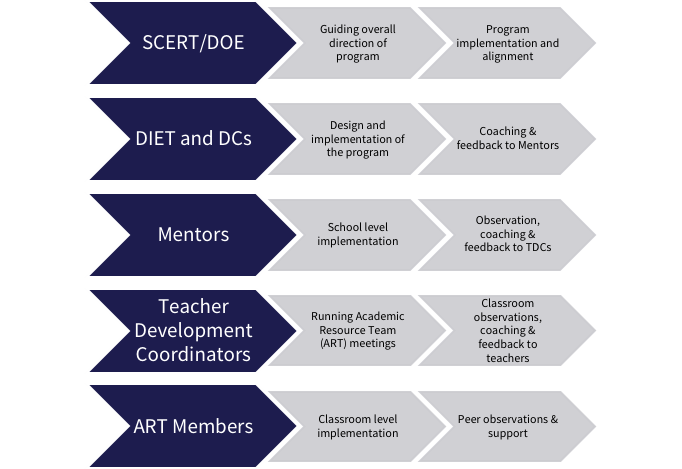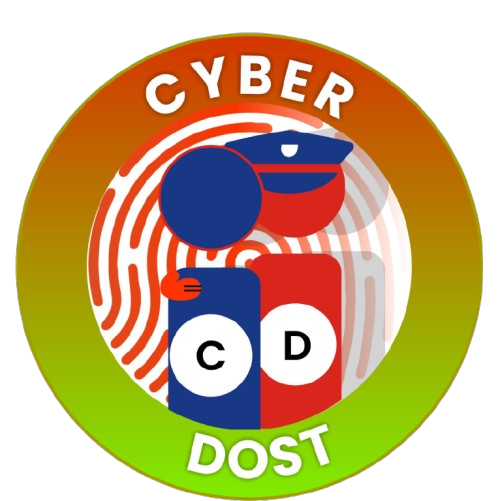Introduction to the TDC program
The Teacher Development coordinator program is an initiative introduced by SCERT in the year 2017, as the extension of the flagship Mentor Teacher Program with the vision of creating a collaborative network of teacher teaching in all DOE Schools. This program primarily focuses on professional development through multiple platforms and envisages a Co-Learning environment where everyone will get the opportunity to experience the journey of professional growth.
As a part of this program one intrinsically motivated teacher who volunteers to be a TDC is being deployed as Teacher Development Coordinator (TDC) in all government schools under the Directorate of Education. The major role of TDC was centered around providing teachers specific academic support and encouraging peer learning/collaboration among teachers.
The TDC program has successfully reached out to all 13 districts in the state of Delhi, covering 1024 schools. The District Institute of Education and Training (DIET) is the academic lead of the TDC program – this institute has supported the program in every aspect. Nine DIETs with 45 facilitators including DIET Principals, DIET lecturers, and District Coordinators across Delhi play a central role in the facilitation and operation of the program.

.jpeg)
More than 250 Mentor Teachers (MTs) also provide regular school level support to the TDCs, along with 5 Program Managers from STiR Education supporting the TDC program in districts as well. Mentor teachers extensively visit schools, collaborate with TDCs, HoS and teachers to ensure effective implementation of the programmatic activities in schools.
_0.jpg)
.jpg)
The Teacher Development Coordinator Program is a dedicated role, which is developed to help achieve a significant strategic goal of the school of supporting teachers in creating schools as learning institutes. Teacher Development Coordinator contributes to the development and management of a consistent and cohesive academic Development in school where everyone can learn. The Teacher Development Coordinator directly works with all the in school teachers under the guidance of the Principal to achieve the vision of program “A System where everyone can learn”.
Outreach
.jpeg)
Programme Objectives
Children and young people today face a world of ‘unknown unknowns’. To succeed, they need to develop a love of learning, and education systems need to support them by building the foundations of lifelong learning. This has been recognized in the development plans of many emerging countries. We support education systems to reignite intrinsic motivation in every teacher and official, to role-model the foundations of lifelong learning for every child.
.jpg)
Every child - is engaged, feels safe, loves learning, trusts and values their teacher, is curious and thinks critically. The teachers classroom practices will be more engaging and support learning for students.
Every teacher -loves teaching and intentionally improves their classroom practice. This includes improving teaching classroom practices to be more engaging and support learning with understanding.
Every local and ministry official - prioritizes the support of teachers, and uses data and insights to continually improve. This also emphasizes improving teacher motivation through peer learning.
_0.jpeg)
Under the five pillars of lifelong learning that we have identified, our program is designed to achieve the following outcomes for teachers so that they, in turn, can support their students in becoming lifelong learners
.jpg)
.jpg)
These outcomes have been articulated based on our read of the evidence of effective teaching and teacher professional development, as well as that on lifelong learning more broadly. This is in alignment with what we see in schools that teachers demonstrate love for teaching and students show love for learning when they are provided with the support they need and processes ensuring safety, engagement, intentional teaching, curiosity & critical thinking and self- esteem are embedded in the system.
“Increased feedback and usage of data by the Mentor Teachers and district officials in monthly meetings.” -UNESCO IIEP Report on TDC Program
How the Program Works
Research shows that to build an intrinsically motivating environment, individuals require:
- Autonomy - Giving everyone a chance to decide how they can best implement proposed skills and strategies.
- Mastery - Creating opportunities for continued professional growth.
- Purpose - Enabling communities that work towards the same goal and support each other.
We recognize that the above outcomes are not easy to achieve. Professional mindsets and behaviors are influenced by a complex web of systemic factors. This is why we take a system-wide approach to professional development, promoting a love of learning across the system, recognizing that effect that one group of stakeholders inevitably has on another. Our approach therefore works through role-modelling and relationships at all levels of education systems. The TDC program does this by incorporating the following three pillars in every activity that is a part of the program:
- Peer networks - creating opportunities for everyone to share with and learn from their peers.
- Action and feedback -centring activities around planning, executing, and getting feedback from each other.
- Reflection - creating space and time to learn from our successes and failures so as to use our experiences to strengthen our skills.
Who all are involved in the program?

AT SCERT, the Lifelong Learning Unit is responsible for the running of the TDC Programme. The LLU consists of 3 bodies:
- Governance Group (SCERT and DOE officials): - Responsible for overall direction of the programme.
- Core Design Team (One representative from every DIET): -Responsible for design of the programme.
- Core Operational Team (District Coordinators): -Responsible for coordination and alignment of programme.
Learning Improvement Cycles
- The TDC program runs through 3-4 month long Learning Improvement Cycles. .
- Each cycle focuses on a different theme (e.g. check for understanding) based on the needs of teachers at that time, along with a Skills Focus for MTs and TDCs that will help them provide better support – determined through a needs analysis led by the Core Design Team.
- Once the theme is decided, the Core Design Team along with a Mentor Teacher Working Group create the material for the LIC.
- The LIC kickstarts with the Core Design Team running a Co-Learning Session (CLS) for all TDC Facilitators from each DIET, introducing the LIC. The DIETs then run CLSs for Mentor Teachers, after which Mentors run the same for TDCs.
- TDCs then hold meetings with the Academic Resource Team members at their school (10-12% of total teachers) and introduce the pedagogical focus. ART meetings are a chance for teachers to share their plans, challenges, successes and failures, and learn from each other.
- After the ART meeting, teachers implement the proposed strategies for a month during which time they are observed by their peers and TDCs, after which they engage in developmental feedback discussions to improve their practice.
- After a month, in ART meeting 2, teachers reflect and plan for the next month and the cycle continues until the end of ART meeting 3.
- Every month, the TDC Facilitators from DIETs sit with Mentors to analyse the month’s data and plan their next steps to provide support to schools.
- (Please see this link for access to all previously completed LICs -Learning Improvement Cycles(TDC Program) or visit the mentioned link for all the LIC reports: https://scert.delhi.gov.in/scert/tdc-report


 State Council of Educational Research and Training (SCERT)
State Council of Educational Research and Training (SCERT) 


